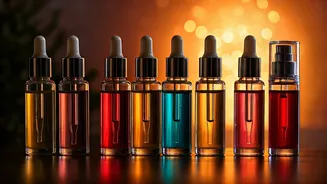Vitamin C: Radiance Revealed
Vitamin C is a powerhouse ingredient, celebrated for its ability to brighten and even out skin tone. It works by reducing pigmentation and correcting any
discoloration, giving your skin a more uniform appearance. This is particularly helpful in combating the effects of glycation, which can lead to a yellowing of the skin. Additionally, Vitamin C is an antioxidant, meaning it protects the skin from damage caused by environmental factors like pollution and oxidative stress. By incorporating Vitamin C into your skincare routine, you’re not just aiming for a short-term glow, but also investing in the long-term health and resilience of your skin, ensuring it remains radiant and healthy.
Retinol: Anti-Aging Power
Retinol is a well-known ingredient in the realm of anti-aging skincare, prized for its ability to reduce wrinkles and promote a more youthful complexion. The ingredient achieves this by boosting collagen production. Collagen is a protein that is essential for maintaining skin firmness. As we age, collagen production naturally declines, leading to wrinkles and sagging skin. By encouraging collagen synthesis, retinol helps to counteract these effects, making the skin look plumper and smoother. Moreover, retinol promotes cell turnover, which helps to remove dead skin cells and reveal a fresher, brighter layer of skin. It's a key ingredient for anyone aiming to slow down the aging process and maintain a vibrant, youthful appearance.
Hyaluronic Acid: Deep Hydration
Hyaluronic acid, often abbreviated as HA, is a hydration hero that delivers deep, lasting moisture to the skin. It works by attracting and retaining water, ensuring the skin remains plump and hydrated. This hydration helps to reduce the appearance of fine lines and wrinkles, giving the skin a smoother, more supple look. HA’s ability to draw moisture from the environment makes it exceptionally effective at combating dryness. Besides topical use, HA is also available in dietary supplements, which could provide additional benefits. This dual approach—both topical and internal—can enhance skin hydration and improve its overall elasticity. For those struggling with dry skin, adding HA to their skincare regimen can be a game-changer.
Niacinamide: Stronger Skin
Niacinamide is a versatile ingredient known for a range of skin-enhancing benefits. It helps to smooth the skin, making the texture more even and refining the pores. Furthermore, it improves skin brightness, making the complexion more radiant, and strengthening the skin barrier. A strong skin barrier is vital because it prevents moisture loss, keeps irritants out, and generally improves skin health. Niacinamide also has anti-inflammatory properties that can soothe irritated skin and reduce redness. It is suitable for nearly all skin types, making it a valuable addition to many skincare routines. The combined effect is skin that looks healthier, more resilient, and more radiant.
Peptides: Youthful Resilience
Peptides are essential components of skincare that contribute to youthful and resilient skin. They work by stimulating collagen production. Collagen is important for skin’s firmness and elasticity. The stimulation helps to reduce the appearance of fine lines and wrinkles, promoting a more youthful complexion. Peptides can also improve skin's ability to repair itself. This can lead to a reduction in scars and imperfections, contributing to a smoother skin texture. They act as messengers, signaling the skin to produce more collagen and other essential proteins, resulting in firmer, more resilient, and younger-looking skin. Incorporating peptides into your skincare is a strategy for long-term skin health.
Salicylic Acid: Clear, Balanced Skin
Salicylic acid is a beta-hydroxy acid (BHA) that is a game-changer for people struggling with acne or oily skin. It's renowned for its ability to deeply cleanse pores and remove excess oil. By penetrating pores, it dissolves the buildup of dead skin cells and sebum that can lead to breakouts. It also has antimicrobial properties, meaning it fights bacteria that causes acne. The result is clearer, balanced skin with fewer breakouts. Salicylic acid is a common ingredient in cleansers, toners, and spot treatments. Its effectiveness in controlling acne and oil production makes it a key ingredient in skincare routines that prioritize clarity and a healthy complexion.













